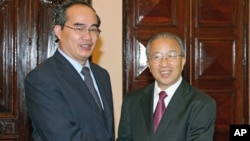China dispatched a fishing enforcement ship to the disputed Paracel Islands, an agency under the country's Farm Ministry said, in a move likely to fuel tension with rival claimant Vietnam, days before Dai Bingguo's visit to Hanoi. Vietnam and China, along with the Philippines, Malaysia, Brunei and Taiwan all claim some island territories in the South China Sea. China's claim cover the largest area and includes the Paracel area, composed of uninhabitable small islands, rich fishing grounds and thought to hold significant oil and gas deposits.
India’s foreign minister is visiting Vietnam this week, where officials are negotiating oil exploration deals in areas of the South China Sea. China lays claim to vast parts of the region, and officials in Beijing have said there can be no such exploration in territory they claim. Amid this backdrop, tensions are rising between the two emerging world powers.
Days after media reports said that India’s state-owned oil company was in talks with Vietnam over oil and gas exploration rights in the South China Sea, China’s Foreign Ministry issued a pointed warning.
Spokesman Hong Lei said any country engaged in oil and gas exploration activities in this jurisdiction without the approval of the Chinese government is infringing upon China's sovereignty and national interest, and its actions are therefore illegal and invalid.
Territorial claims amid energy hunt
India's Foreign Minister S.M. Krishna is in Vietnam with a stated diplomatic focus of expanding energy exploration near islands in the South China Sea, which Vietnam claims as its own. China says history entitles it to claim the entire South China Sea and the islands in question.
Warnings to stay out of the decades-long dispute between Beijing and Hanoi began emerging last week, even before Minister Krishna departed for the Vietnamese capital.
Chinese spokeswoman Jiang Yu said China hopes foreign countries will not get involved in the dispute and support efforts to solve the dispute through bilateral channels.
Indian officials say they plan to increase the scope of energy cooperation with Vietnam. Senior Indian Defense Ministry Official M. Pallam Raju said India's resolve to back its diplomacy is firm.
"We will protect our interests very strongly, so there's no backing away from that. There's no reticence," said Raju.
Many nations sharing borders
Besides China and Vietnam, Indonesia, Taiwan, Brunei, Malaysia, and the Philippines also have competing claims over the South China Sea.
Despite the contested claims, Teshu Singh, a research officer with the Delhi-based Institute of Peace and Conflict Studies, backs Indian officials who say the energy deals with Vietnam are legitimate.
"Indian cooperation with Vietnam or any other country for that matter in the world is always as per international laws, norms, and conventions. It's just another part of larger India-Vietnam ties," said Singh.
Complicating factors
Besides containing rich potential deposits of energy, the South China Sea is a source of seafood for all of Southeast Asia, and a major thoroughfare for commerce. Singh said because so many nations depend on the area, brinksmanship over the region is both unlikely and undesirable.
"It's not just about two or three countries. So I believe a sense of preventive diplomacy has to be built in this area. There has to be some preventive mechanism in this area," said Singh.
There are several other irritants in the India-China relationship. India hosts the Dalai Lama, the Tibetan spiritual leader whom China views as a separatist. Chinese maps also claim an entire northeastern Indian state as part of its control over Tibet. Additionally, China's military and nuclear support of Pakistan makes many Indian leaders uneasy.
Still, both sides argue they have more to gain from economic cooperation than confrontation. The two countries will have an opportunity to address the South China Sea issue and other issues of concern at the first India-China Strategic Economic Dialogue, scheduled to take place next week in Beijing.




